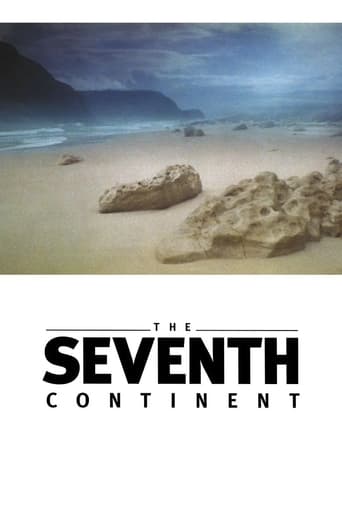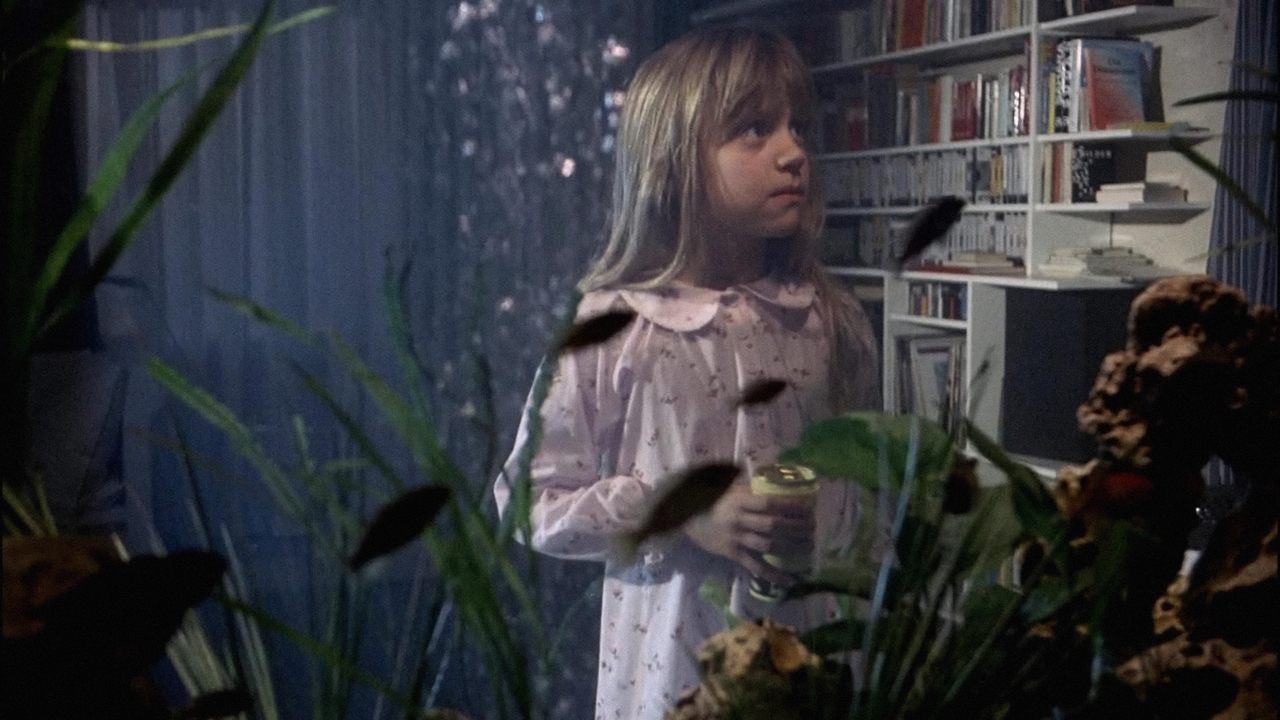RisingStar12
If I could go back, I would never have seen this film, yet I know that such a thing is not possible, nor is it really what I want. I am "glad" I have seen this film like I am "glad" to be informed about the suffering of others in the daily newspaper. This is not a happy film. This is not a film that will make you feel good. If you feel that everything in life will be wonderful after viewing this film, you have missed the point. If, on the other hand, you become so frightened at your life and what you have failed to make of it that you instantly shoot yourself in the bed, you have missed the point. I do not believe that this film was made to show suffering just for the sake of suffering. Why would any film do that? There are far too many hints and visual clues for there to be no meaning. There are reasons why the camera angles are the way that they are. There are shots of objects instead of people for a reason, which is to show the materialism of human beings and the ways in which humans try to define their life through media sources and other sources instead of human contact. There are daily rituals, such as eating, cleaning, listening to music, and writing letters to family, that add up to nothing because no meaning has been given to them. These characters try to find meaning, but they never give meaning to anything. And because of this, they suffer.This is the basic plot: a daughter tells her schoolteacher that she cannot see. The teacher contacts the parents and asks the daughter if she is blind. The daughter says she is not. After this, the family slowly (and I put emphasis on the word "slowly") deteriorates. This is, essentially, all that happens. Subtle does not even begin to describe how slow this process is. Subtle should be banned from the list of adjectives used to describe this film. For those who like to see a family deteriorate by means of arguing, shouting, and phrases such as "You never loved me!" and "I just want our family back!", this is not a film for you. I cannot imagine how short the shooting script must have been, but I imagine it was so small that it continuously got lost during shooting. A lengthy script is never a requirement for a film, which is (after all) a visual medium. The lack of a proper story leaves the viewer with a large time to think. Very little is really explained. It is not a "blame" movie, by which I mean that this is not a film that makes references to why something happened. "Oh, she started crying because her boss is mad at her and they just got into an argument." "Oh, he just destroyed that lamp because he was upset over the death of his mother eleven years ago." Because there is no explanation, I found myself constantly trying to make one. I was obsessively trying to understand why the characters did what they did. Was it because of something in the past? Were they upset over the prospect of their future? When no answers could be found, I looked for even smaller details, such as colors and micro-expressions on a person's face. In this sense, the film is brilliant in that you cannot stop thinking about it. Is this what the filmmaker wanted us to do? There is a good possibility that it is. If this is the case, then the film succeeds on more than one level. At the end, I found myself not just thinking about the lives of the characters (which, knowing that it is based on a true story, made it even all the more disturbing), but also about the lives of others and, eventually, about my own life. This is not an inspiring film, but it is a motivational one. There are two types of motivational films: those where the characters get beat up by the world but decide to fight back and those where the characters just get beat up. Are both inspiring? No. Are both motivational? Yes, especially the second of the two. Sometimes the image of seeing someone fail can become so frightening and so nauseating that we think, "But how can they do that to themselves?" The most frightening part of the whole thing is not when we see their lives, but when we look at our own lives and notice the similarities. This is The Seventh Continent.
tonymurphylee
A family, starved for attention and desperate to escape their daily life of abrasive routine, decide to turn things around one year and go against the routine. The film depicts their lives in three painful years of isolation, meaningless actions, and disillusionment. The first two-thirds of the film show the loud and hectic world that they are inexplicably a part of. Everything is just a series of actions. The semi-apocalyptic sequence shows a kind of desperate forcefulness of life that never breaks though, and the claustrophobic nature comes across as frighteningly unnerving. Tarkovsky would be proud.The Seventh Continent was the second Michael Haneke film I had seen after The Piano Teacher. While I do not think that it is as honest a film as The Piano Teacher, I do applaud the fearless dynamic of the film to be completely devoid of style and of typical film conventions in order to depict a world that grows increasingly unpredictable and harrowing. The film is very Hitchcock-like in how it slowly and quietly builds it's themes involving desolate emotions. It is a tremendously scary film, but it is scary in a way that comes off a lot stronger after the film has finished and you allow it's images to swim around in your head for a while. The loss of passion and of feeling in a human being, to my knowledge, has never been depicted in such a pessimistic way. This is a very angry film. This is a very resentful film. This is a film that celebrates sadness and anger and I hated watching it. When the film finds time to depict humanity, it writes it off like it is useless. What makes me even more angry about the film, in a way, is how you can almost feel Haneke behind the camera feeling resentful and wanting to punish the audience for wanting to view a film with a good story and a moving and engaging plot. Haneke goes so far out of his way to provide nothing in the way of narrative power and instead opts to craft an angry and traumatizing film. What makes the film work is it's power to provide some deeply haunting imagery and some truly worthwhile substance that I couldn't help but appreciate. Two of these three characters have complete control over everything that happens and they obviously feel that what they do in the final act of the film is most beneficial. Who am I to judge their own control over their lives. What pisses me off is how simple minded they are as characters. I just feel that Haneke prefers to emphasize these problems that these characters share, and what I am bothered by was that he didn't make it less obvious.Overall, it's not one of Haneke's best films, but for a debut theatrical picture it is about as good as one can get. What strikes me as rather unusual about this film, when compared to his other films, is how it suffers from the same major problems that pretty much all of his films have. For example, he has never been able to build any sympathy with any of his characters, at least from the films of his that I've seen, and this film is no different in that regard. The film of his that I personally think suffers the most from it is Funny Games (both versions). With his picture Cache, it only became a problem early on in the film, and in Benny's Video and Hour of the Wolf it helped add to the atmosphere while damaging the humanity of the films in question. I think that The Seventh Continent shows plenty of promise with Haneke and is extremely riveting at times, but it's easily the absolute worst place to start if you are interested in getting into his films. It will not leave you with a good impression of his work, and only after watching Funny Games and Cache (his most easily accessible films in my opinion) will you be able to catch his reoccurring themes.
kiljoy78
I put a question mark after spoiler alert because the fact that they off themselves in the end wasn't particularly shocking. I am quite shocked with the positive reviews this film received. I did not find it particularly disturbing or all that depressing, what I mostly found it was boring. There was no real character development, nor narrative development. I think their suicide speaks to inner torment of people who are equally sad and bored in their life, sadly I'm relatively happy, so I means little to me. The acting performances did not solicit any emotion from me, which I don't think is the fault of the actors, but I think it is what the director asked for in the piece. It was very absurd, but there is humor at the heart of absurdity, not torment. Why,simply because absurdity lacks the ability to solicit emotions from others in a vacuum of characters. when someone crushes a milk carton you don't grieve the milk carton unless you can anthropomorphize (msp) it in some way and these characters weren't; they were empty. There was no conflict. the sole redeeming quality I enjoyed about the film is the way it removed the veneer of eroticism and beauty from violence, and made it trite, which it is. This movie, however, stands far below Cache and Code Unknown in the haneke repertoire.
Donnie Zuo
"The Seventh Continent" is as disturbing as any Haneke's film can get, and being confined to a family with almost no other outside interactions makes this story even more upsetting.Living a routine life of deathly stillness, the family portrayed in this film is unsurprisingly typical in our modern society where people hardly pay attention to fundamental things and senses. They got up at 6 a.m.; they had milk and oats for breakfast; they wore and polished their shoes; they had their car washed...Haneke was "considerate" enough to show us their daily actions with so incredibly rich details that you almost felt like a member of the family.As Haneke said, they are actually not living --- they just simply went through motions.It's horrible how you got so used to the things always around you that you just ignore them --- even they're your families.I thought they finally realized the problem...Well they did actually. However, it was just so late that they figured out a crazy way to achieve liberation.Shocked to the core as I was, I thanked this story to hold me up by the violent actions as soon as I was about to relate this family to mine --- No surprises or inspirations but routines and trivialities is all the similarity we can afford to share with this extreme family.It's always more comfortable to be unmoral among disputes than be perceptive surrounded by flaws. **(spoiler)I wonder if at that night they didn't drive by the accident thus didn't see the bodies, would the wife trigger their self-consciousness...** Either way is a tragedy anyway.Let this real story be a lesson to all of us who forgot how to live.


 AD
AD

